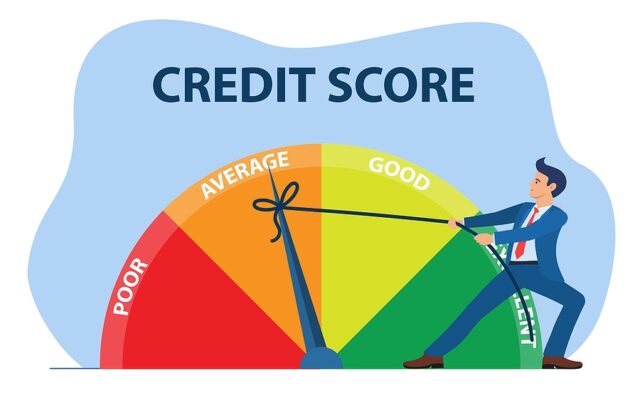
Credit scores are one of the most important factors when it comes to a person’s financial health. A good credit score can open up opportunities for loans, mortgages, and other forms of financing that can help people achieve their goals. On the other hand, a bad credit score can make it difficult or impossible to get approved for these types of financing options.
So, what exactly do credit scores measure, and how do they affect your ability to borrow money? In this article, we will explore the answers to these questions and more in order to better understand why credit scores play such an important role in our financial lives.
Understanding Credit Scores

Understanding credit scores is essential for making informed financial decisions. A credit score is a number that reflects your creditworthiness, indicating how likely you are to pay back loans and credit card debts on time.
Lenders and creditors rely on this score to determine whether to grant you credit and at what interest rate. The higher your credit score, the better your chances of getting approved for credit and receiving lower interest rates.
Improving your credit score takes time and effort, but it’s crucial for achieving financial security. By understanding the factors that impact your credit score and taking steps to improve it, you can open up new opportunities and gain greater control over your financial future.
The Importance of Credit Scores
Maintaining a good credit score is crucial in today’s world. It’s a measure of your financial responsibility and proves your creditworthiness to potential lenders. Credit scores determine the interest rates, loan amounts, and terms of credit that lenders offer you.
A high score can save you thousands of pounds on interest payments, while a poor one can cost you dearly. Your credit score also affects other aspects of your life, like getting a job, renting an apartment, and even buying insurance. It’s essential to monitor your credit report and resolve any errors to avoid any negative impact on your credit score.
The importance of credit scores cannot be overstated, so make sure to keep yours in good standing!
Impact on Borrowing Opportunities

One of the primary reasons credit scores are important is their impact on borrowing opportunities. Lenders, such as banks and credit card companies, use credit scores to assess the risk involved in lending money to individuals.
A higher credit score indicates a lower risk, making your application favourable when compared to people with bad credit to apply for mortgages, credit cards, and loans like short-term loans, unsecured loans, emergency loans, etc., from a reputed direct lender like Lending Stream.
Influence on Interest Rates
Credit scores also play a significant role in determining the interest rates offered by lenders. Individuals with higher credit scores are more likely to qualify for lower interest rates, saving them money in the long run. On the other hand, lower credit scores may result in higher interest rates, leading to increased borrowing costs.
Effects on Insurance Premiums
Believe it or not, credit scores can even affect insurance premiums. Insurance companies consider credit scores as an indicator of a person’s financial responsibility. A lower credit score may lead to higher insurance premiums as it suggests a higher risk of filing claims.
Role in Rental Applications

When searching for a place to live, credit scores can impact rental applications. Landlords and property management companies often review credit scores to assess a tenant’s financial reliability. A poor credit score might lead to difficulties in securing a rental property or require additional security deposits.
Employment and Credit Scores
In some cases, credit scores can influence employment opportunities. Certain employers, especially those in the financial sector, may check credit scores during the hiring process. They view credit scores as a reflection of an individual’s financial stability and responsibility.
Building and Maintaining Good Credit
Given the significance of credit scores, it is essential to focus on building and maintaining good credit. Timely payment of bills, reducing debt, keeping credit utilization low, and avoiding excessive credit applications are some effective ways to improve and maintain a good credit score.
Monitoring and Improving Credit Scores

To stay on top of one’s credit health, it is crucial to regularly monitor credit scores. Several online services provide free credit score monitoring and updates. Reviewing credit reports for errors and addressing any inaccuracies promptly can positively impact credit scores.
Debunking Credit Score Myths
There are several misconceptions surrounding credit scores that need debunking. Contrary to popular belief, checking one’s own credit score does not harm it. Additionally, closing old credit accounts might not always be beneficial, as it can decrease the overall credit history length.
Conclusion
Credit scores are indeed important and can significantly impact various aspects of our lives. From borrowing opportunities and interest rates to insurance premiums and rental applications, credit scores play a crucial role. Building and maintaining good credit, monitoring scores, and debunking myths are essential steps to ensure financial well-being and access to opportunities.
FAQs

How often should I check my credit score?
It is recommended to check your credit score at least once a year. However, if you are planning to apply for a loan or credit card, it’s a good idea to monitor your credit score more frequently.
Can I improve my credit score quickly?
Improving credit scores takes time and consistent effort. While there are no overnight fixes, responsible credit management, such as making timely payments and reducing debt, can gradually improve your credit score.
Do credit scores differ between countries?
Yes, credit scoring models may vary between countries. Each country has its credit reporting system and criteria for calculating credit scores.
Can a low credit score be fixed?
Yes, a low credit score can be improved over time. By adopting responsible credit habits and addressing any negative factors, it is possible to increase your credit score.
Does having no credit history affect my credit score?
Having no credit history can make it challenging to establish a credit score. However, there are ways to build credit, such as using secured credit cards or becoming an authorized user on someone else’s credit card.









